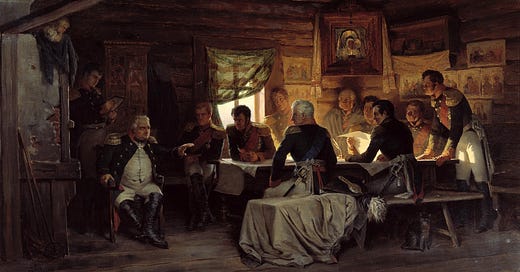Upgrade to paid to play voiceover
This is a long post and is best viewed online here. To get these updates in your inbox, subscribe to Footnotes and Tangents and turn on notifications for War and Peace 2024. This post is now available to download as a podcast: search for War and Peace 2024 wherever you get your podcasts.
Welcome to Week 33 of War and Peace 2024
This week, we have read Book 3, Part 2, Chapter 37–Part 3, Chapter 4.
Everything you need for this read-along and book group can be found on the main War and Peace page of Footnotes and Tangents. There you will find:
The reading schedule with links to daily chat threads for each chapter.
Weekly updates like this one.
Keep reading with a 7-day free trial
Subscribe to Footnotes and Tangents to keep reading this post and get 7 days of free access to the full post archives.



